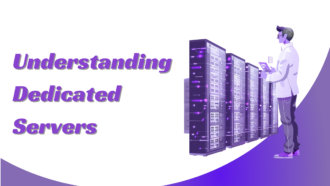How to Pick the Right Cloud Platform for Your Applications and Websites
- 1 Factors for Picking the Right Cloud Platform for Applications and Websites
- 1.1 Cloud Management Control Panel
- 1.2 Global Data Centres Availability
- 1.3 Customer Support
- 1.4 Platform Uptime
- 1.5 Support for Major Operating Systems and Developer’s Tools
- 1.6 Security Features and Updates
- 1.7 Cloud Server Pricing
- 2 Conclusion
Since Covid-19, many businesses had to go through a digital transformation and started working online. Rightly so, since shutting down the businesses ultimately wasn’t an option.
This has increased the formation of websites and applications like never before.
With businesses shifting their focus to digital transformation recently, cloud services have become reasonably necessary in enterprises. These services let the users quickly access applications, software, and other resources through a network without the need for local infrastructure or hardware.
However, for many organizations, transitioning to cloud services has been challenging mainly because there are many different cloud service providers with other web hosting services.
Therefore, knowing how to pick the right cloud platform for your applications and websites is essential to make the right decision. We have covered some factors to look for while selecting a cloud service platform.
Factors for Picking the Right Cloud Platform for Applications and Websites

Here are the significant factors you must look for in a cloud service provider before making your final decision.
Cloud Management Control Panel
If explained in the simplest words possible, a cloud management control panel works as a control unit for you as a customer of the cloud hosting platform that you select for your applications or websites.
Once you get hold of your cloud server, you must install and configure applications and services. Additionally, taking care of all the plan backups and security matters is also essential. This is where a cloud management control panel comes to the rescue.
It is mainly used to perform routine tasks like gathering information such as IP addresses or hostname, monitoring memory usage or CPU, and managing security applications. A cloud management control panel’s primary purpose is to save you some time and effort and simplify complex tasks.
Even when it comes to installation, and you don’t know what to install on your server, this cloud management control panel will help you decide what you need to do with your website. Not only this, but if something happens that needs your attention, this control panel will provide you warnings through different means, including phone calls, emails, or instant messaging.
Global Data Centres Availability
The data center is basically a physical location where cloud providers store their computing machines and hardware. It contains the infrastructure IT companies require, including servers, network equipment, data storage drives, etc.
The Global data center availability of a cloud provider means the cloud region comes with various availability zones, which is basically a grouping of one or more closely located data centers. Each availability zone can have multiple data centers, but not two of them can have the same.
Cloud platforms should provide globally spread data centers and various availability zones to ensure that they offer highly available and resilient cloud deployment. Each cloud platform service is not necessarily available in each region due to infrastructure limitations, regulatory restrictions, etc.
Therefore, having multiple region options available on the cloud platform to choose from gives you the freedom to select the one that is closest to you. This helps in reducing the chances of network latency and achieve the highest performance possible.
Customer Support
You may sometimes face problems or issues like slow network performance, server downtime, security breaches, etc., while getting services from a cloud provider. While you may know how to handle all this stuff, it is not logically possible that you will look after your server 24/7.
This is where customer support from the cloud provider plays an important role. The right cloud service platform will immediately come up with the right solutions for the issues your website is facing and also ensure that they don’t happen again in the future.
Additionally, if your website or application is not technologically compatible with the cloud platform, you must ensure that the vendor supports all your hardware and software requirements. This can only be possible if they have an excellent customer support team that is always available to look after your needs.
Therefore, customer support plays a huge role in making a cloud platform suitable to be chosen for your website or applications.
Platform Uptime
Uptime is the measure of the time period through which the platform is working correctly. Uptime is measured in percentage, which shows the amount of time during which the cloud platform has remained active throughout the year.
When you select a cloud platform, ensure that it is guaranteed to provide you with 99.95% uptime or more. It is always better to choose a cloud platform that offers guaranteed and highest uptime so that your website doesn’t face negligible downtime and, as a result, you provide an excellent experience to your customers.
Uptime calculation goes like this:
- 99% = 3.65 days of downtime per year.
- 5% = 1.83 days of downtime per year.
- 8% = 17.53 hours of downtime per year.
- 9% = 8.77 hours of downtime per year.
- 95% = 4.38 hours of downtime per year.
- 99% = 52.6 minutes of downtime per year.
- 999% = 5.26 minutes of downtime per year.
With an increase in number of nines, the downtime per year decreases.
Support for Major Operating Systems and Developer’s Tools
The cloud platform you use should support several operating systems to give you the choice of selecting the one that suits your needs the best.
When it comes to a clouds, the operating system that it supports is essential because it helps in storing data in the cloud rather than local devices and also helps in running software applications.
Some additional benefits of cloud operating systems include the elimination of the need for expensive hardware upgrades, seamless collaboration and remote work capabilities, enhanced security because the data is stored in the cloud, and many more.
When it comes to developer tools, the cloud platform should also be able to support them for offering up-to-date information to all users and storing data. These developer tools play a significant role in tracking the performance and safety of the applications and their services.
Security Features and Updates
Security is usually the top concern of businesses for running their applications and websites. Therefore, security features provided by a cloud platform are one of the most prominent features that you need to look for.
If you are running a website or an application that needs to store or share sensitive data in the cloud, you must ensure that the cloud platform provides excellent security to keep your data safe. Cloud providers are investing heavily in security procedures and technologies to ensure that the data centers are secure from malware functions and meet the industry’s standards.
Updates are also an important service provided by cloud platforms. While things do run themselves in a cloud environment, however, they all require periodic updates. These updates help in resolving security issues, featuring enhancements or even bug fixes.
There are seven types of updates in a cloud platform:
- Hotfix: Address specific issues like fixing a rare case bug.
- Patch: modifies or updates an existing item being updated.
- Version update: used for increasing the version number.
- Rollback: works as a backup plan when things go wrong.
- Platform rollback: Return to normal version if an update goes wrong.
- Snapshots: to provide quick restore to the previous state.
- Backups: for restoring the data from the known state.
Cloud Server Pricing
Budgets vary from business to business, and therefore, at the end of the day, they play a major role in selecting the cloud platform. Regarding pricing, the cloud servers usually work on a pay-as-you-go rule, which means you will only need to pay for the resources you use.
However, all the cloud hosting platforms have their own pricing and packages, and therefore, before making the final decision, you need to compare their prices to see which one suits your needs and budget the most.
As the features increase, the pricing also grows on the cloud platforms. Consider various features, including storage types, migration execution costs, server count, connectivity costs, bandwidth, support and maintenance costs, etc., to see if the features you need and their prices are according to your demands and budget.
Conclusion
There is no denying that cloud platforms are the present and future of IT services, thanks to the fantastic services they offer. With businesses shifting their focus on digital transformation after the COVID-19 wave, cloud services have become a major part of enterprises.
However, with multiple cloud service providers available online, selecting which one to go with can turn out to be quite overwhelming. To ease that out for you, we have covered all the major factors you need to look for to answer your query about how to pick the right cloud platform for your applications and websites.
From the pricing they charge to the features provided by the platform, selecting the right cloud services provider can make your applications and websites run smoothly and efficiently.

















